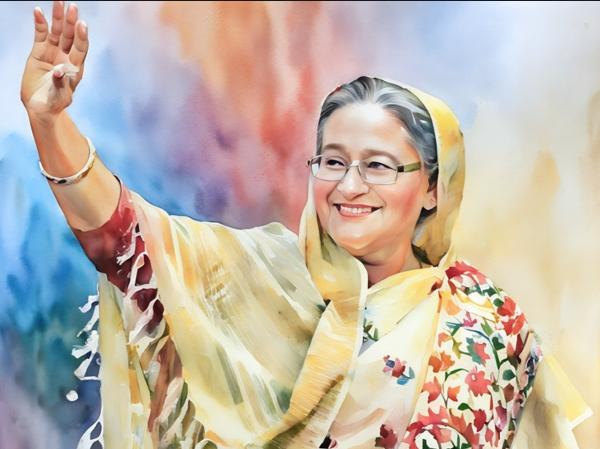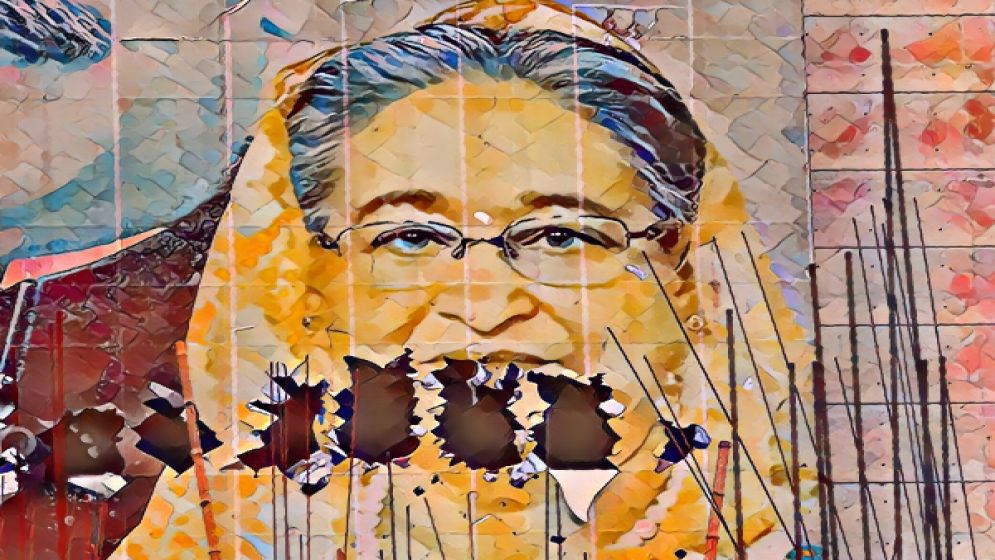Hasina’s leaked conversation: A bluff laden with subtle messages the public won’t buy
-66e3400229715.png)
The recent phone conversation between deposed dictator Sheikh Hasina and US-based Awami League activist Tanveer [surname not known] has circulated widely on social media, leading to a flurry of speculation, assumptions, and, notably, memes.
This shift from viewing Hasina, the Awami League, and their activities with suspicion, apprehension and seriousness to treating them with humor and jest reflects a significant change in public sentiment among the Bangladeshi populace.
Over the past decade, many were scared of speaking out or criticizing Hasina, even for valid reasons, let alone creating memes or humorous posts. Consider the case of cartoonist Kishore, who faced harsh consequences for his satire of Chowdhury Nafeez Sharaft, an Awami cronies who made millions by looting banks.
However, following the thwarted "counter-revolution" of August 15 and the humiliating arrest of Awami League figures like Salman F Rahman and Anisul Huq, there is a growing belief that without the support of corrupt police, RAB, or military intelligence, the Awami League's cronies lack the power to exert control on the streets.
So, it's no surprise that the phone conversation has shifted from being treated seriously to becoming a target of ridicule. Contrary to popular belief, this is actually a positive development. It indicates that the people of this country have begun to shed their fear of the oppressive and authoritarian regime, despite its 15 years of harsh rule.
I’ve carefully listened to this conversation and have made some observations.
1: First and foremost, this conversation appears to be staged and was likely leaked with the approval of the highest echelons within the Awami League, potentially even with Hasina’s consent.
The Awami leader/activist Tanveer, based in the US, presumably communicated with Hasina through a secure platform like WhatsApp or Signal.

In previous instances, leaked conversations in
Bangladesh were reportedly released by military intelligence or the National
Telecommunication Monitoring Center (NTMC), which was last led by the notorious
Major General Ziaul Ahsan.
Under Hasina’s regime, such leaks were typically sanctioned by top authorities to gain political advantage or to shift public attention from more pressing issues to sensational or trivial matters. Hasina's administration has shown a skill for employing such smoke and mirrors tactics.
However, it’s unlikely that either Bangladesh's military intelligence or the NTMC could intercept or eavesdrop on a conversation between a US-based activist and Hasina, who is currently residing in India.
Thus, the leak was almost certainly orchestrated by high-ranking members of the Awami League and carefully crafted to convey a specific message.
2: So, why do I believe the conversation is staged? It's mainly due to Hasina’s manner of speaking. She was unusually calm, composed, and used measured language, which contrasts sharply with her typical crass style.
The country is well accustomed to her blunt and often abrasive manner in public speeches and press conferences.
Hasina is known for her derogatory remarks and boastful rhetoric when addressing political opponents or dissenters. However, in this "leaked conversation," she used surprisingly docile language, even when discussing issues like the attacks and arson targeting Awami League leaders' homes after August 5.
She chose her words carefully to play the victim and emphasize the "helplessness" of her party members, including herself, by claiming they were slapped with false and fabricated charges—an assertion that, while not incorrect, was presented in a way that seemed designed to evoke sympathy for the Awami League.

This careful and measured approach suggests
she aimed to regain public sympathy through this orchestrated dialogue.
3: The purported staged conversation also carries significant underlying messages from Hasina. She mentioned that she is now residing closer to Bangladesh—likely referring to the bordering region of West Bengal—and suggested she would be willing to return to Bangladesh if a favorable opportunity arises.
To me, this seems like a bluff. I doubt Mamata Banerjee's West Bengal has offered her refuge, as the political cost for Mamata would be too high. Moreover, Hasina is undoubtedly safer in the Indian capital than in West Bengal, which has recently been rocked by major protests related to a doctor’s rape case in a hospital.
Hasina likely made this bluff to boost the morale of her party members, many of whom have been disheartened by her departure and the danger it left them in. The constant praise and reliance on Hasina expressed by the US-based leader Tanveer also subtly suggests that no Awami League leaders or activists are unhappy about her fleeing the country, despite the challenging circumstances they face.
4: In the conversation, Hasina also sought to dismiss the allegations of corruption against her, including the claim of diverting $5 billion from the Rooppur power plant project—an accusation I personally find implausible. She labeled these allegations as not only false but also absurd.
Additionally, she spoke about the countless hours she has dedicated to the country’s development—an assertion that has become so repetitive to the Bangladeshi public that it is now considered an irritating refrain. Moreover, she absurdly claimed that under Yunus' administration, banks were being looted.
The most significant aspect of the conversation was Hasina's directive to Tanveer to document the “false cases” and abuses inflicted upon Awami League leaders and activists after August 5 and to submit this information to US authorities.
It's clear that in the past month, Awami League leaders and activists have faced backlash from political opponents and the public. Many have been hit with multiple cases—a tactic that appears to have originated from within the Awami League itself—leading to genuine concern and criticism.
Nevertheless, it seems that the public has seen through the "leaked and staged" nature of this conversation and Hasina’s bluff. Even if that’s not the case, the overall presentation certainly gives that impression.
—-
Harun Ur Rashid is a journalist and commentator

